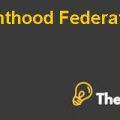Fuyao Glass: Global Strategy For u.s. Country Risk Case Study Analysis
Executive Summary
Fuyao Glass Industry Group, a leading automotive glass manufacturer, stands at a strategic crossroads, evaluating its global expansion amidst escalating U.S.-China tensions. Production and shipping expenses for auto glass are the focus of this review, centered on the contrast between China-to-U.S. and local U.S. manufacturing. Additionally, the presence of both export purchases and FDI for entering the American market adds further complexity to decision-making.
Our recommendation advocates a hybrid production model, optimizing cost efficiencies from both China and the U.S., strategically transitioning from export sales to FDI. Diversification into North America, Europe, Asia-Pacific, and Latin America mitigates market risks, emphasizing technological innovation in mature markets and strategic partnerships in emerging regions. Fuyao's success hinges on adaptability, monitoring trade policies, and a nuanced approach to secure a dominant position in the global auto glass market.
Situational Analysis
Cost Comparison: Fuyao AG Production and Shipping Strategies
When evaluating the costs associated with Fuyao's automotive glass (AG) production and shipping strategies, two main scenarios emerge.
Production in China and Shipping to Detroit
Firstly, producing AG in China and shipping to Detroit entails lower labor costs due to the significant disparity in hourly labor rates approximately $2.5 per hour in China compared to $20 per hour in the United States. However, the major drawback lies in the substantial transportation costs, estimated to be 30% higher than the alternative option. Moreover, the potential imposition of tariffs on AG imports from China adds another layer of complexity, affecting competitiveness.
Production in Mount Zion and Moraine and Trucking to Detroit
In terms of production, Mount Zion and Moraine serve as promising locations for manufacturing AG and shipping it to Detroit. This strategy not only brings proximity to the market but also slashes transportation expenses by up to 30%. Although labor costs in the U.S. can be steep, local production could lead to cost reductions. Furthermore, the recent trend of levying tariffs on imports from China may make local production more reasonable from a cost perspective. Nevertheless, setting up production facilities in the United States will necessitate weighing the initial expenses.
Impact of Proposed Tariffs
In the context of proposed tariffs, Chinese production faces increased costs, with potential tariff rates ranging from 2.5% to 50%. This could lead to supply chain disruptions and extended lead times due to heightened customs clearance processes. Conversely, U.S. production might become more cost-competitive if tariffs are imposed on Chinese imports, potentially benefiting from reduced tariff rates.
Comparison of Fuyao Entering the U.S. Market
Pros
Exporting allows Fuyao to enter the U.S. market with lower upfront costs compared to setting up manufacturing facilities. This is particularly beneficial for testing market demand before committing to significant investments. Fuyao can quickly adapt to changes in market demand without being tied to a physical production facility. This flexibility is advantageous in responding to market dynamics and adjusting product offerings accordingly. Export sales enable a faster entry into the U.S. market since there's no need to establish local production facilities. This speed can be a critical factor in gaining an early foothold.
Cons
Exporting from China to the U.S. involves higher transportation costs, especially for fragile products like automotive glass. These costs can impact the overall competitiveness of Fuyao's products in the U.S. market. The products may be subjected to tariffs, affecting the overall cost structure. Tariff implications can change based on trade policies, adding an element of uncertainty. Fuyao's presence is limited to sales and distribution activities, potentially affecting relationships with Original Equipment Manufacturers (OEMs) that prefer local suppliers for collaborative product development.
Foreign Direct Investment (FDI)
Pros
FDI allows Fuyao to benefit from cost efficiencies associated with local production. Reduced shipping and transportation costs contribute to a more competitive pricing strategy. Establishing manufacturing facilities in the U.S. enhances Fuyao's local presence. This is crucial for building strong relationships with OEMs, understanding market nuances, and providing efficient customer support. With local production, Fuyao can potentially avoid or mitigate tariffs, making its products more cost-competitive in the U.S. market.
Cons
Setting up manufacturing facilities involves a higher initial capital investment. This upfront cost can be a barrier, especially if market conditions are uncertain. FDI exposes Fuyao to uncertainties in the U.S. market, such as changes in demand, regulatory environment, and potential shifts in trade policies. The process of establishing facilities, obtaining necessary approvals, and starting production take time. This delays the market entry compared to the faster route of export sales.
Evaluating Attractive Markets for Fuyao's Entry in the Global Auto Glass Market
North America
North America, especially the U.S., has one of the largest automotive markets globally, providing significant growth opportunities. The region values innovation and advanced automotive technologies, aligning with Fuyao's commitment to quality and technology. North America is a mature market, which might result in intense competition. However, Fuyao's focus on technology and quality can help differentiate its products..........
Fuyao Glass Global Strategy For u.s. Country Risk Case Study Analysis
This is just a sample partial case solution. Please place the order on the website to order your own originally done case solution.













